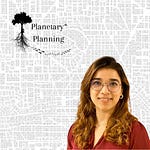In this episode, we speak with Jamie Wang, urban environmental humanities scholar, editor and poet. She works as Research Assistant Professor in the Department of Literature and Cultural Studies at the Education University of Hong Kong, and is editor of the journal Feminist Review. Jamie has recently published the book Reimagining the More-Than-Human City. Stories from Singapore, and we discuss some of what she explores in the book, as well as her broader perspectives, inspiration, and some examples on more-than-human cities and the example of Singapore in particular.
In this conversation, Jamie shares some key insights from her book, especially around the interrelations between the three core themes of eco-modernist theory, more-than-human studies, and future / futuring studies. Through this, Jamie helps de-center not only the human but also the urban that is so central to human thought and also to the Planning discipline nowadays. She furthermore gives special emphasis to the idea that more-than-human thinking is not equal to non-human, that is, that this lens does not flatten the still important relations between humans among themselves, but perhaps rather sharpens and complexifies our understanding of this also. In her book, Jamie seeks to use storytelling methods - inspired by Deborah Bert Rose and Tom van Doren who have also come up previously, for instance in the episode with Isabelle Doucet; see also our episode with Phoebe Wagner on Solarpunk storytelling. Through this approach, she argues that it becomes much more possible to speak of complexity and multiplicity, and to address planetary themes without losing sight of micro-narratives that are key for deeper understanding.
Jamie also shares some examples from Singapore, such as concering its changing politics regarding green spaces, shifting from “garden city”, to “city in a garden”, to “city in nature”, and gives us a glimpse into how very particular politics and modernisation aspirations can shape a city over time, also as this city-state claims its place in global politics and global imaginaries. She highlights that solutions for more-than-human futures will most likely not be harmonious, that choices about inclusion and exclusion are inevitable, but can be much more transparent and considerate of all species (for those interested, this also links back nicely to our episode with Jonathan Metzger). Jamie shares some concrete examples of what this might look like, but also says much work is still needed, including the inclusion of multiple species in the visualisations of changing landscapes - which also means that the past, present, and future should be folded into one another when imagining futures, so that we can better perceive whose habitats are being prioritized, who is winning and who is losing.
Take-aways for planners (jointly with others!), by Jamie Wang:
Accelerating discussions and action on environmental issues, co-existence, displacement, global capitalism, and related themes.
Think about the past and the present as imagined futures. See what had to be removed so that this could be, who is in it and who had to be removed. Also when imagining and imaging (creating images) about it.
Enable the public (including planners) to “imagining better”. In other words, creating conditions for imagination.
In the face of climate change, Planning probably needs to go beyond a mathematical issue, but take a more holistic view.
References:
Nixon, R. (2013) Slow Violence and the Environmentalism of the Poor. Harvard University Press.
Wang, J. (2024) Reimagining the More-Than-Human City. Stories from Singapore. MIT Press.












Share this post